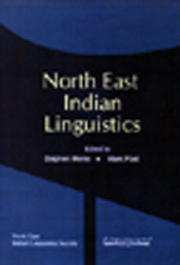Book contents
- Frontmatter
- Contents
- Introduction
- Foreword
- Phonology
- Lexicon
- Morphology, Syntax, and Semantics
- 9 Causative Prefixes in Four Boro-Garo Languages
- 10 Similarities in Verbal and Nominal Morphology In Atong
- 11 Temporality in Bishnupriya
- 12 Explicator Compound Verbs in Assamese and Kashmiri: A Comparative Analysis
- 13 Explorations in the Nonfinite Verbal System in Asamiya
- Language Description and Language Endangerment
9 - Causative Prefixes in Four Boro-Garo Languages
from Morphology, Syntax, and Semantics
Published online by Cambridge University Press: 26 October 2011
- Frontmatter
- Contents
- Introduction
- Foreword
- Phonology
- Lexicon
- Morphology, Syntax, and Semantics
- 9 Causative Prefixes in Four Boro-Garo Languages
- 10 Similarities in Verbal and Nominal Morphology In Atong
- 11 Temporality in Bishnupriya
- 12 Explicator Compound Verbs in Assamese and Kashmiri: A Comparative Analysis
- 13 Explorations in the Nonfinite Verbal System in Asamiya
- Language Description and Language Endangerment
Summary
Introduction
The four Boro-Garo languages that this paper analyzes are Boro, Garo, Rabha (pronounced by native speakers as rába) and Tiwa (known earlier as Lalung) whose close affinity to each other has long been accepted. The Boro data is drawn from the dialect spoken in the Bongaigaon-Kokrajhar region south of Bhutan, while the Garo data is from the A we dialect of Garo spoken in northeastern Garo Hills and the adjacent parts of Assam plains. A we, from which our data has been drawn, incidentally, is also the dialect that has found its way into books as Standard Garo. The Rabha data represents the Róngdani dialect found in the Goalpara District of Assam. Northwestern Karbi Anglong and some adjacent areas of Khasi Hills as well as the Morigaon District of Assam constitute the last bastions of Tiwa speakers. Umswai, from where the Tiwa data is gathered, is the hub of this small area.
Suffixes dominate the morphology of these four languages. Nevertheless the presence of different fossilized and semi-productive prefixes found in the four languages would lead us to conclude that at some time in the past they probably had much more prefixal morphology than today. One area of these four languages where this can be found is the area of causative forms. Boro, Garo, Rabha and Tiwa show different degrees of (mostly fossilized) prefixed causative forms.
Phoneme inventories
For the sake of brevity I present a summary of the phonemic inventories of the four languages, taking them from Joseph, U. V. and Robbins Burling (2005).
- Type
- Chapter
- Information
- North East Indian Linguistics , pp. 153 - 167Publisher: Foundation BooksPrint publication year: 2008
- 1
- Cited by



